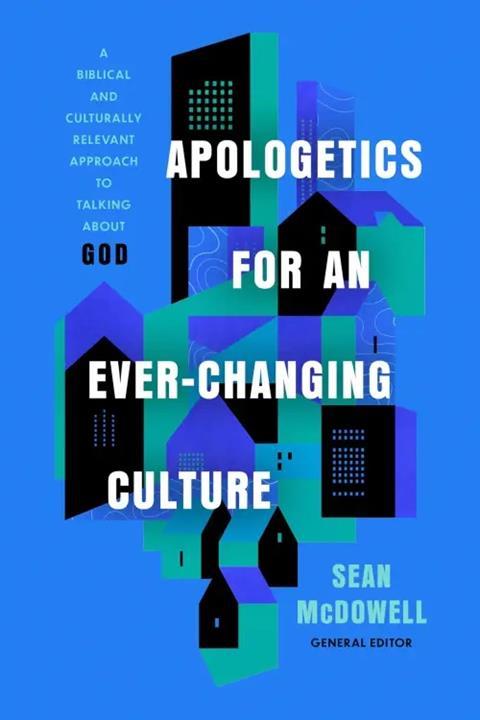In Apologetics for an Ever-Changing Culture, Sean McDowell and a team of other authors explore creative and compassionate ways to engage with the toughest objections to the Christian faith. This book will equip you to share truth with wisdom, grace and conviction, says Paul Valler

The Christian apologist Sean McDowell’s latest book is an excellent and wide-ranging resource for Christian readers seeking to deepen their confidence in the truth and engage effectively with those in today’s secular culture.
In Apologetics for an Ever-Changing Culture McDowell significantly expands on his earlier work, Apologetics for a New Generation, bringing together over 20 experienced contributors. The result is a rich collection of creative ideas and approaches designed to equip Christians for the ongoing battle of worldviews that defines our times.
McDowell highlights a crucial challenge often overlooked by the Church: the difficulty of changing someone’s worldview.
For many, shifting their beliefs can feel as shocking and frightening as suddenly realising they are driving the wrong way down a motorway or like Neo’s awakening in The Matrix, discovering you have been living in an alternate reality. Given this, one of the aspects I most appreciated about this book is its early emphasis on the attitude and tone of our communication, reminiscent of Valiant in John Bunyan’s Pilgrim’s Progress - a character who fights bravely for truth but also struggles with an internal enemy, ‘Inconsiderate,’ due to his tendency to be insensitive to those who are struggling. This is an ever-present challenge in apologetics: to contend for the truth in a way that is full of consideration and grace.
Josh McDowell, the author’s father, contributes an insightful chapter on relational apologetics, reminding us that while people often rationalise and intellectually defend their worldview, it is frequently their emotional response to believers that ultimately changes their views. In a society where relationships are damaged, for many people the truth of our message is not enough in itself. People only hear it when they are also aware and concerned about their emotional well-being.
There’s a wealth of creative and diverse apologetics strategies tailored for different audiences in the second part of the book. Contributors explore practical applications in parenting, youth ministry, and engaging with audiences online. The book explores imaginative ways to subvert contemporary cultural narratives to present the truth of God, drawing on the apostle Paul’s speech at Athens in Acts 17 as an example. It was refreshing to see the topic of helping people through doubt addressed, and I particularly appreciated the concept of ‘Big Box Christianity’ - creating space for meaningful fellowship and engagement with those who hold different perspectives.
The third and most controversial section of the book boldly dives into some of today’s most contentious issues, including racial issues in urban America, homosexuality, transgender identity, feminism, abortion, and mental health. There is also a chapter on critical theory which examines postmodernism’s influence and challenges the tendency to interpret everything through the lens of oppression versus oppressor - a framing that can, ironically, become oppressive itself. The book also addresses the rise of New Age beliefs and practices, which the author links to the serpent’s original lie: “You will be like God.”
Perhaps because public life and social media often push us toward forcefully expressing certainties, many contributors on these controversial issues took a firm stance, seeming confident that those who disagreed were simply wrong. It wasn’t clear if these apologists recognise the shades of pastoral grey that will occur when applying truth to messy, individual lives.

The final chapter underscores the vital importance of biblical authority. Today’s culture of personal autonomy and expressive individualism means the locus of authority has shifted inwards to the self. As a result, any external authority that challenges the ‘authentic self’ is often viewed as oppressive or harmful. Many of today’s Christian controversies ultimately stem from this issue, with the phrase ‘that’s just your interpretation’ becoming a convenient ‘get out of jail free card’ for those unwilling to submit to God. The author emphasises that much of the Bible’s moral teaching is clear, posing a fundamental question: What does the Bible say, and will I obey?
It would have been good to see a discussion on carefully handling ambiguities in scripture’s interpretation. Clear understanding is vital, but throughout history, abuses of power have sometimes stemmed from misinterpretations of scripture. These past mistakes serve as a cautionary reminder that apologists must approach their work with humility and an open mind. Is there room in apologetics for the ability to say, ‘I’m not sure’?
As we apply the many excellent arguments in this book, we must pray to be led by the Holy Spirit and model Jesus, full of both grace and truth.
Apologetics for an Ever-Changing Culture by Sean McDowell (Harvest House Publishers) is out now






































No comments yet